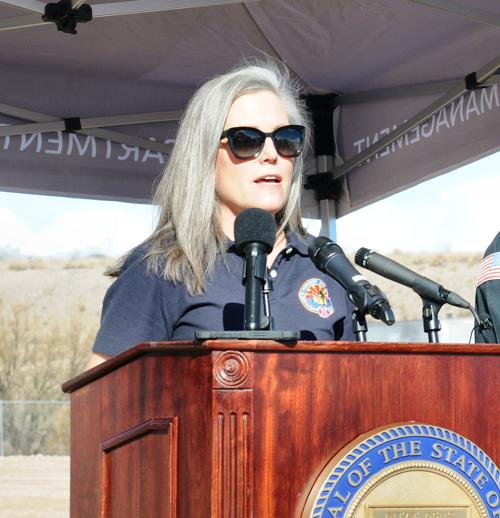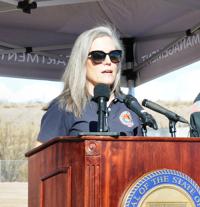PHOENIX — Gov. Katie Hobbs said Friday she's aware lawmakers intend to send an issue directly to the ballot in 2026 ballot once she vetoes a bill to curb voters' ability to drop off their early ballots.
But Hobbs said it doesn't need to come to that. The Democratic governor said she's willing to try again to reach a deal with Republicans that would give them what they want ¯ a Friday before Election Day deadline for ballot drop-offs — if she gets at least some of what she wants.
That is unlikely to happen.
Rep. Alexander Kolodin said some things on Hobbs' list, including same-day voter registration, are non-starters with Republicans. Ditto loosening up on regulations about who can bring someone else's ballot to polling places.
And the Scottsdale Republican said he's not afraid to put, on the 2026 ballot, exactly what Hobbs has said she will veto Monday. He said polling shows a majority of voters want not just an earlier deadline to drop off early ballots but also new requirements for people to automatically receive early ballots every year.
People are also reading…
Hobbs, for her part, said there's a downside to Republicans refusing to deal.
She said if they truly believe changing the deadline for early ballots to be dropped off is important, reaching a deal with her now could ensure that happens in time for the 2026 election. But if the issue can't go to voters until the 2026 election, then the earliest any change could happen would be 2028.
The dispute stems from the claim by some lawmakers and county officials that voters are frustrated with having to wait days to find out who has won close elections.
Part of that is due to the fact that people now can drop their early ballots into a box at polling places up to 7 p.m. on Election Day. But these aren't tabulated until the signatures on the outsides of the envelopes are verified, which can't be done at polling places.
More to the point, that verification process does not start until county officials first tally the votes cast in person on Election Day. And in close races — such as Hobbs' 17,117-vote victory over Republican Kari Lake in 2022 — it took nine days for the Associated Press to call the race.
The key provision of House Bill 2703, sent to the governor on Thursday by the GOP-controlled Legislature, spells out that anyone who gets an early ballot has to return it to a polling place or early voting location no later than 7 p.m. the Friday before Election Day. That is modeled after a Florida law.
Those with early ballots still could show up at polling places on Election Day. But they would have to stand in line with others and present identification so that their ballots could be verified on site, eliminating the need for such action to occur later in the week.
"I can support taking action that would make election results happen faster,'' Hobbs said Friday. "But we're not going to do that in a way that disenfranchises voters And that's exactly what this bill does."
Hobbs said, however, she's willing to give on the issue of the Friday deadline, and that she made that offer to GOP lawmakers behind the bill.
One of her proposals, she said, was to scrap existing laws that say only those who have registered to vote 29 days ahead of the election can cast a ballot.
Kolodin, one of the chief architects of HB 2703, said that's not negotiable.
He noted that Arizona requires people to present "documented proof of citizenship,'' or DPOC, before they can register.
"The whole way the DPOC law works is first they search the databases,'' Kolodin said. "If they can't find the proof of citizenship, then you have a certain amount of time to cure it. You can't have that with same-day registration.''
He said there's no reason for Republicans to give in on that.
"I know that the voters of Arizona want to make sure that everybody's who's registered to vote is a citizen,'' he said. In fact, the requirement was put into state law through a 2004 ballot measure approved by a margin of 56-44%.
Hobbs said if Republicans don't like that proposal, she had several others.
"Our position was never that we needed to have all or nothing,'' she said. "We offered several different solutions that would have provided. And they rejected all of them.''
One of her objections, for example, is a provision in HB 2703 that says anyone who wants to continue getting an early ballot — something now automatic for those who vote regularly — would have to take an affirmative action every year to confirm their address.
"It also guts early voting, mail-in voting, which has been very successful in our state,'' the governor said. In fact, more than 80% of the ballots cast in 2022 were from early voters.
Kolodin defended the provision, saying it ensures that people who have moved get their ballots. "It's also a security issue,'' he said.
He said Hobbs was late to the game, only offering up ideas once it was clear Republicans had the votes to approve HB 2703. He also called some of what she proposed "vague.''
And there's also something else: He said Republicans don't feel any need to cut a deal with the governor.
If the issue has to go to the ballot, he's confident voters will side with the GOP lawmakers and not with her.
"We've polled all of these things,'' he said. "We've asked people, 'Do you want this trade-off or no? We know this stuff is wildly popular. We know, as much as anybody in politics can know things, that voters will approve it.''
Get your morning recap of today's local news and read the full stories here: tucne.ws/morning









